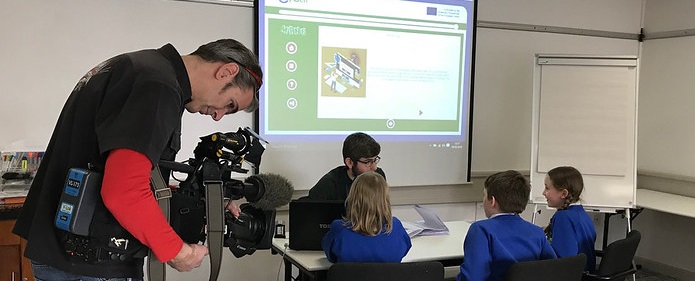
Developing child-led internet safety resources through Erasmus+
With more and more children being online for longer and parents often struggling to manage their internet use, the cyber safety of children is a growing concern.
It is an issue, however, that the University of Northampton has addressed in a unique way with the help of Erasmus+ funding.
Working with partner universities and schools across Europe as well as directly with children, teachers and parents in four countries, the University of Northampton's Cyber Safe Generation: Digital education by design (CyGen) project has developed a web app and resources to promote child safety online.
Unique insight into children's digital experiences
The project was coordinated by Helen Lomax, Professor of Childhood Studies at University of Huddersfield and visiting professor at Northampton.
“With more than nine in ten (92%) children aged 5-15 going online (Ofcom, 2018) the main objective of our project was to support young people's safe use of the internet," she said.
 "We developed a linguistically, culturally and age-appropriate multimedia education programme which was co-produced and designed with young people, aged 8-13, teachers and parents in the partner countries.
"We developed a linguistically, culturally and age-appropriate multimedia education programme which was co-produced and designed with young people, aged 8-13, teachers and parents in the partner countries.
"We believe the resulting web app and resources can help everyone to use the internet safely, wherever they live.”
As well as higher education institutions in the UK and Denmark, the partnership also included schools in Greece, the UK, Belgium and Denmark, with children involved at every level.
“By engaging fully with children and young people, we gained unique insights into the challenges facing them in their uses of digital media, its risks and how to mitigate these," said Helen.
"The children who took part also valued being given a voice and having their experiences acknowledged, rather than being ‘talked down to’ about the ‘do’s and dont’s' of the internet. Involving teachers, parents and children from a selection of schools in different countries added considerable value to the project and gave us an insight we probably couldn’t have achieved otherwise.”
Michelle Pyer, Senior Researcher at the University of Northampton agreed.
“Recent research suggests that 50% of 10-year olds have their own smartphone, and a quarter of ten-year olds claim to have a social media profile (Ofcom, 2019).
"We wanted to understand the opportunities and challenges faced by children when they go online.
“The team recognised that children are experts in their own lives, and this underpins the work that we do. We believe that using children’s and young people’s ideas to create the CyGen programme, in a field that is dominated by adult-led content, was a unique approach.
"We developed the web app to support children’s safety online, designed by children, for children, built on their knowledge and experience. We hope that the outputs, as well as the ways that we worked with the children, will be of use to families and educators.”
The web app
Paul Bramble, Research Project Manager at University of Northampton, explained how the web app is helping young people.
“It enables pupils to engage in a virtual learning environment, offering them ‘real-life’ scenarios in which to enact and explore the possibilities of the digital environment. Each of the character activities within the app is focused on developing children’s digital skills.
"More specifically, the app has been designed to encourage both ‘online’ engagement and ‘offline’ discussion between children, teachers and parents. In so doing, it responds to a need articulated in the academic literature (Livingstone et al, 2011) and by children, teachers and parents in our project for greater dialogue and shared understanding about the challenges children experience online.
“The project also created online open-access guidance that includes lesson plans and resources to support teachers and educators in primary and secondary schools, in diverse European education settings, to support children’s online safety.”
Far-reaching impact
As well as developing a practical and useful tool and accompanying resources, taking part in the project had its own benefits for the children.
“The sustained period and depth of engagement with the children throughout the last three years generated notable increases in their critical thinking and digital confidence, as well as more generally in their soft skills, like communication, creativity, confidence and collaboration," said Helen.
The beauty of an Erasmus+ Strategic Partnership is how it brings together diverse skills and knowledge from different sectors
"This was evident in the children’s participation in the project, leading workshops in the UK, Denmark and Greece, and even appearing and talking on BBC regional news and radio as spokespersons for the project.
“Working internationally, the Erasmus+ Key Action 2 project has broadened our horizons to the vast amount of knowledge children have around the internet. Working with them, we have developed child-led internet safety resources that are beneficial not only to the school  environment, but the wider community, including universities who are training teachers.
environment, but the wider community, including universities who are training teachers.
"Through our partner school in Greece, the CyGen resources will be introduced across 350 schools in the prefecture of Peloponnesus - reaching over 50,000 students, 1,750 teachers and almost 20,000 parents."
Future plans
“The beauty of an Erasmus+ Strategic Partnership is how it brings together diverse skills and knowledge from different sectors.
"Our team benefited from colleagues with complimentary skills in user-centred design and digital pedagogy, child development, education, research and evaluation.
“Feedback from the children we worked with has given us some great ideas for continuing to develop the resources from the project.
"Both UK universities will continue their relationship with the partners, supporting the exchange of good practice with the schools that we have worked with, ensuring the benefits of the project live on.”
Interested in receiving funding for a Key Action 2 HE project? Find out more now!
